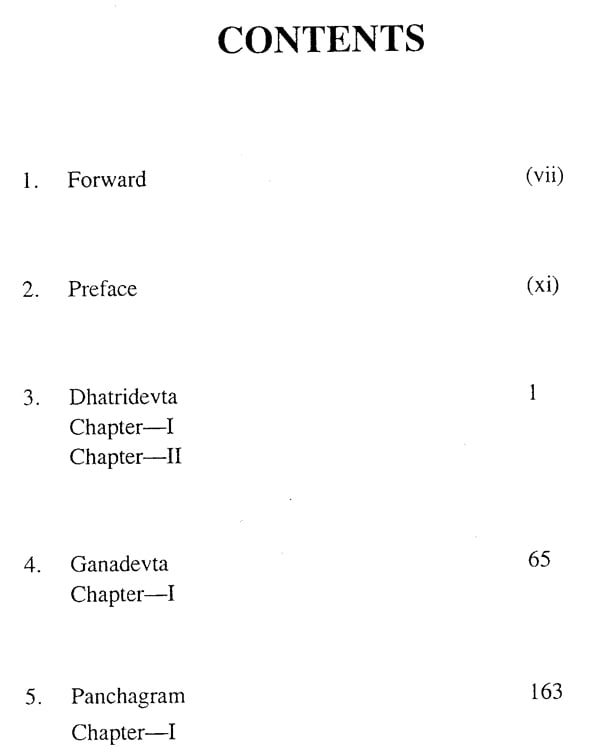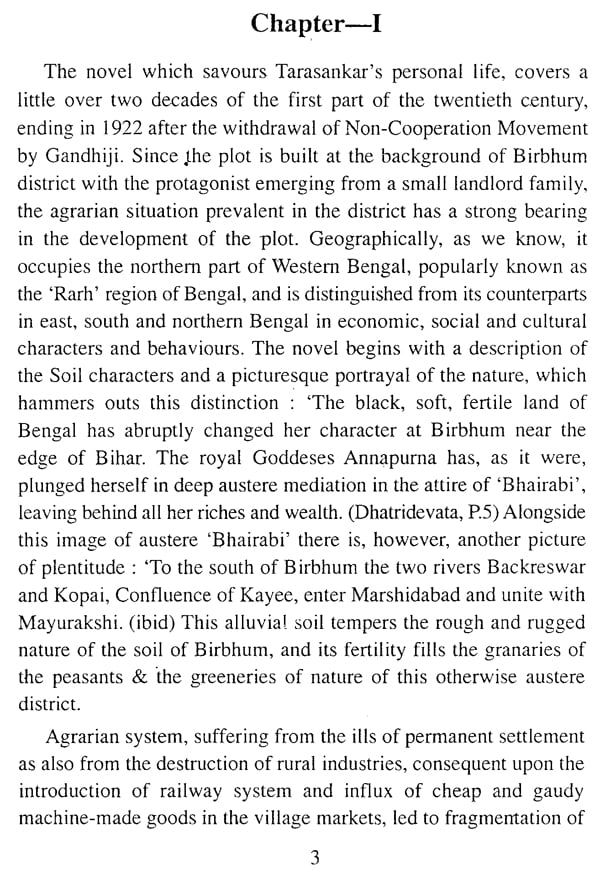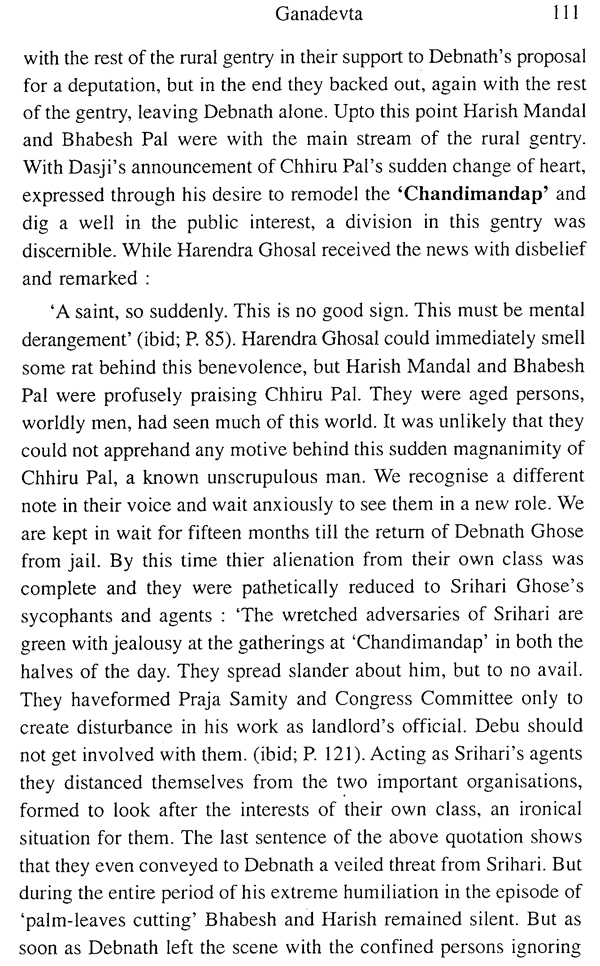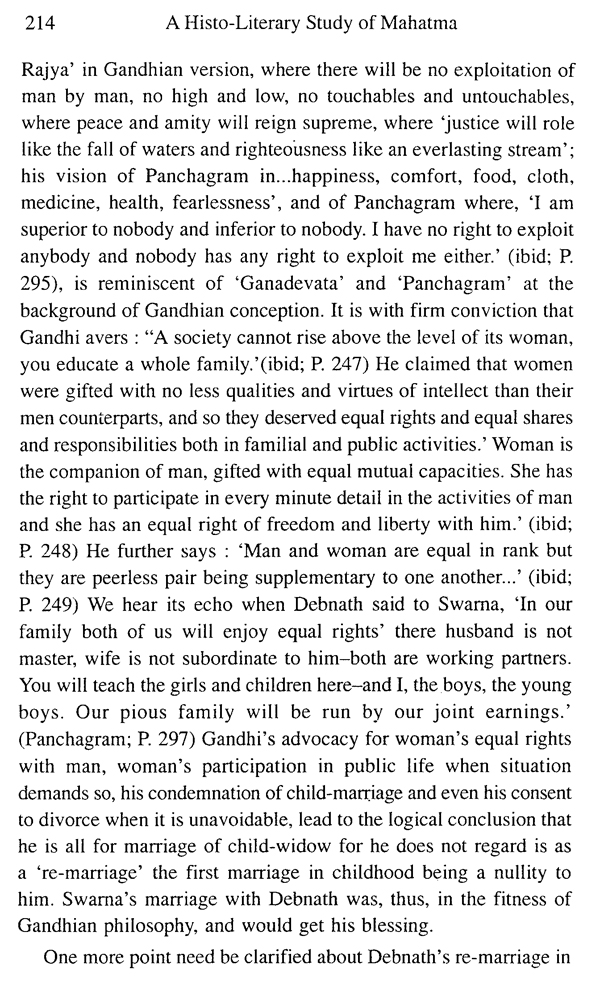About the Book Literature is a recognized source material for history, for literature has to be true to its time, and literature lives on and thrives in the food mainly supplied by the contemporary time and society. For three decades in the first part of the 20th century the Indian life and society was tossed and turned by the Freedom Struggle in India, and Mahatma Gandhi was at the crest of the wave of freedom movement. He was an exceptional, rare and out of the ordinary freedom fighter in the sense that his weapon in this fight consists in high moral principles -" Non-violence", Truth-force and Soul-force. This call for stabilizing "Ram Raj'ya", that is rule of social justice, touched a sensitive chord of the Indian people, high and low, rich and poor, literate and illiterate, urban and rural. The time and society of this period remain inescapable to the profound influence of this mesmerizing personality, and literature in Bengal of this time and after, responded this ennobling influence gratefully. The present book intends to show this influence, as also the influence of some other contemporary historical events in Tarasankar Bandopadhayay's three novels, "Dhatridevta", "Gandevta" and "Panchagram". It engages itself to display how masterly the author of these three novels has combined the social, economic and political history of the times with the characters and situations of the novels in question, yet remaining effortlessly true to the artistry of a high literary quality.
About the Author The author is a scholar man with two medal one gold and one silver from Rabindra Bharati University, to his credit devoted himself to study on Mahatma Gandhi a Freedom Struggle in India, as also to literature, both Bengali and English, for a Ion time. He retired as an officer from W.B. Govt. i 1996 and since then h engaged himself i serious studies, writings and in guiding student of higher studies. This maiden work, the result of in-depth studies in both fields of history and literature.
Back of the Book Now standing at the threshold of the twenty first century, when politics and moral values are as foggy and filthy as our breathing air it is inconceivable how our forefathers hundred years before breathed in air surcharged with the patriotic fervor and high moral value of our leaders like C. R. Das, Subhas Chandra Bose, Mahatma Gandhi and a host of other national leaders; of them all, Mahatma Gandhi with his lofty Principles of "Non-violence". "Truth Force" and "Soul Force" come to be the father-figure of his countrymen, high and low, rich and poor. His influence was all-pervasive and it permeated the life of his countrymen without much stir or fuss. Bengali literary artists responded to the message sent by Mahatma Gandhi to his message of patriotism, nationalism, non-violence, of freedom from foreign rule, from religious sectionalism, from superstition. Love for truth, for faith in God was the corner stone of his message. Tarashankar Bandopadhyay who himself was an ardent follower of Gandhi, created his protagonists in the novels under discussion as "Satyagrahi" in the evolutionary process. The situations were created accordingly; the plots were constructed with an eye to this evolutionary process. The plot construction and characterisation displayed Tarasankar's masterly skill and craftsmanship. History and literature are finely interwoven and to a conscious reader the presence of Gandhijee's great principles of "Non-violence", "Truth Force" and "Soul Force", untouchability, love for humanity, service to the distressed people, fearlessness for the sake of "Truth and Justice", permeating the stories of the novels, is inescapable.
Forward This book (Vol. I) is intended to make a careful study about the influence of Mahatma Gandhi, Father of the Nation, on Bengali literature. For this purpose I have selected in this volume three novels as illustration by Tarasankar Bandopadhyay-Dhatridevta, Gandevta and Panchagram. It is a known fact of history, that under the stewardship of Mahatma Gandhi the Congress was lifted from a party of the few to a party of the masses, and it was only a party of the masses that could make even a most oppressive and obstinate government surrender to the mass-pressure and make allowances to the united and dissatisfied people of a country. And if that and dissatisfied people of a country. And if that country was subjugated to an imperialist ruler, those allowances boost the morale of the masses and one day turn into demand for full independence.
Similarly, under the leadership of Mahatma Gandhi the demand for self-government, for `Swaraj' ultimately mounted to demand for full independence; the mass movement starting just as 'Non-Cooperation', passing through 'Civil Disobedience, turned into giving bold ultimatum to the imperialist government to 'Quit India' bag and baggage immediately. Throughout the three decades since the entrance of Mahatma Gandhi into India's political career, national upheavals, with intermediate short waves of freedom movement, followed one after another. The punctuated short movements sustained and fostered the spirit of the people and made their desire and determination for independence bolder and intenser day by day; and when the nationwide upheavals came, they found the people prepared and eager to participate wholeheartedly.
Preface This book is a humble tribute to Mahatma Gandhi, a high-priest of Von-violence' and tireless pilgrim in the quest of 'truth' and `soul-force'. It is a tiny drop in the ocean of books written and thousands of lines invested on this saintly and yet political man exploring the prismatic facets of his life and thought. It is puzzling that a life lived so simply, a philosophy spelt out so transparently and messages transmitted so repeatedly through the daily chores of his life and activities, remained persistently so enigmatic to even the best of our minds. It is interesting to note how celebrated personalities representing history, philosophy, literature, politics and even science have shed light on Mahatma Gandhi. They brought to the fore different aspects of his life and thought, his achievements as well as his limitations. Praises even from his critics and disapproval from his close cronies have gone a long way to make this man as puzzling as mesmerizing. For a man to whom life has appeared not in pieces but as sum total of religion, politics, ethics and economics, life is likely to be debatable.
Simple as his mode of life is, "The workings of his mind are far from simple or easy to follow...his simplicity and directness in action and his candour in statement are as remarkable...as are his subtlety and intricacy of thought and argument on others"?' Sir Mirza M. Ismail's (Dewan of Mysore) remark is equally illuminating. "He is the eternal enigma of India... Mahatma Gandhi is among the great men of world whom all praise but few understand.'?2 And when this man is a prolific writer, leaving a large body of corpus that is encompassed in as many as hundred volumes, the task of understanding him becomes all the more Difficult.
Book's Contents and Sample Pages




















